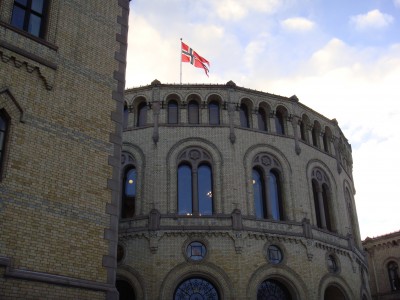NEWS ANALYSIS: Norway’s chapter of the international organization PEN, dedicated to freedom of expression and human rights, is testing the Norwegian government’s commitment to such values itself. In awarding its Ossietzky Prize to American whistleblower Edward Snowden, Norsk PEN is demanding that Snowden be allowed to accept his prize in Oslo without fear of being arrested and extradited for prosecution in the US.

It’s not the first time the Norwegian government has been put in an awkward position over Snowden, who revealed the US National Security Agency’s’ widespread and illegal surveillance of its own citizens and spying on its own allies, including Norway, three years ago. Snowden’s revelations led to official apologies, new laws and more control over illegal surveillance, but he remains charged with violating the US Espionage Act, breaking his vow of confidentiality and theft of government property. US officials want him arrested and tried in the US for treason, and will expect Norwegian officials to turn him over if he sets foot on Norwegian soil.
Debate continues over whether Snowden, currently living in exile in Russia, is a patriot who exposed massive constitutional violations in his own country or a traitor for revealing national secrets. Many media outlets and literary organizations, meanwhile, have hailed Snowden for his bravery in exposing what Oslo newspaper Aftenposten called on Tuesday “a surveillance monster gone amok, that put itself above the rules of democracy and the laws of its own country.” Snowden has since been among those nominated for the Nobel Peace Prize.
Last year the Norwegian government was also challenged when another literary organization awarded the now-32-year-old computer expert with its Bjørnson Prize “for advancing freedom of expression.” Like Norsk PEN, Norway’s Bjørnson Academy (named for human rights champion Bjørnstjerne Bjørnson who also wrote Norway’s national anthem) called on the government to guarantee Snowden’s freedom while in Norway to collect his prize.
The government claimed it couldn’t guarantee Snowden would avoid arrest and extradition while in the country, since it’s bound by an extradition treaty with the US, Norway’s most important ally. Both the conservative government and opposition politicians in Parliament, led by Jonas Gahr Støre of the Labour Party, also claimed Snowden’s case was a matter for the police, immigration authorities and the courts, not least since Snowden’s US passport was revoked.

It may not be “so easy” this time, noted Aftenposten on Tuesday. Now William Nygaard. leader of Norsk PEN, is putting the government to the test again and he is a powerfully symbolic figure himself. Nygaard is the former book publisher who was the target of an assassination attempt in 1993 that was tied to his company Aschehoug’s publication of Salman Rushdie’s Satanic Verses. He survived and has continued his own commitment to freedom of expression. Now he expects his government to do the same.
“Norwegian authorities must secure that he (Snowden) can obtain travel documents and a guarantee for free movement,” Nygaard told newspaper Dagsavisen on Tuesday. Nygaard further contended that Snowden can’t legally be returned to the US if it will have serious political consequences for him.
“For us, it’s important that we put the spotlight on the Snowden case with him here to develop the debate over limits on national and international surveillance,” Nygaard said. He thinks both Norwegian and other international authorities have avoided engaging themselves in the issue for fear of the consequences for major political cooperation. “It’s almost unbelievable that hardly any politicians, apart from perhaps representatives of the Socialist Left party (SV), have taken a position on this,” Nygaard added.
EU officials have given Snowden the status of “whistleblower” and defender of human rights, and encourage EU members to grant him asylum. All the EU countries, however, have an extradition treaty with the US and none has been willing to challenge it. Norway is not a member of the EU.

Aftenposten commentator Harald Stanghelle noted in a column published Tuesday that no country can officially allow individual citizens to decide when it’s correct to violate confidentiality clauses and reveal national secrets. The Snowden case, he wrote, is full of paradoxes and they’re all rearing their heads with the Norsk PEN prize. It’s named for Carl von Ossietzky, the radical German pacifist who dared to defy Adolph Hitler by revealing the German government’s rearmament in violation of the Treaty of Versailles. Ossietzky was arrested, imprisoned, convicted of treason and ultimately sent to a concentration camp in 1933. He was awarded the Nobel Peace Prize in 1936, infuriating Hitler who declared that no German would ever be allowed to receive a Peace Prize again. That in turn led to the only time in the history of the Peace Prize that the Norwegian monarch, King Haakon VII at the time, “stayed away from the award ceremony, probably prompted by the Government, which feared German reactions,” according to the Nobel Institute.
It was not Norway’s proudest moment, and Ossietzky was prevented from traveling to Oslo to collect his prize. He died in prison in 1938. Nazi Germany invaded Norway two years later, in 1940.
Ossietzky’s chair in the University of Oslo’s Aula, where the Peace Prize ceremony was formerly held, was empty 80 years ago and now speculation is swirling as to whether Snowden’s chair will be empty as well. Norsk PEN’s ceremony is also due to be held in the University’s Aula, on November 18.

At issue, according to Stanghelle, are “principles versus pragmatism, backbone versus cowardice, freedom of expression versus self-censorship and reconciling words with actions.” Norwegian politicians at both ends of the political spectrum are quick to promote freedom of expression and human rights, except, perhaps, when that might offend an important ally like the US government which, Stanghelle wrote, “will gladly overlook international rules when it suits.”
Now, he suggests, it’s time for Norway to “stand up for the rights we love to view as our fundamental values.” The government, he said, “can’t close its eyes (again) and pretend this isn’t up for them to decide. That’s cowardly, and can be understandable, but the price of holding the world’s most important whistleblower at arm’s length is being robbed of all credibility in our time’s most important debate over rights.”
It will be tough decision for Prime Minister Erna Solberg, just as she also can finally welcome a new US Ambassador to Norway this week. The question, according to Stanghelle, is whether Norway, in the name of democracy, “can demand a lot of others, but not make demands on ourselves if it’s going to cost us.” Nygaard of Norsk PEN said he will soon be taking contact with the Norwegian authorities to secure Snowden safe entry and exit from Norway this autumn.
newsinenglish.no/Nina Berglund

